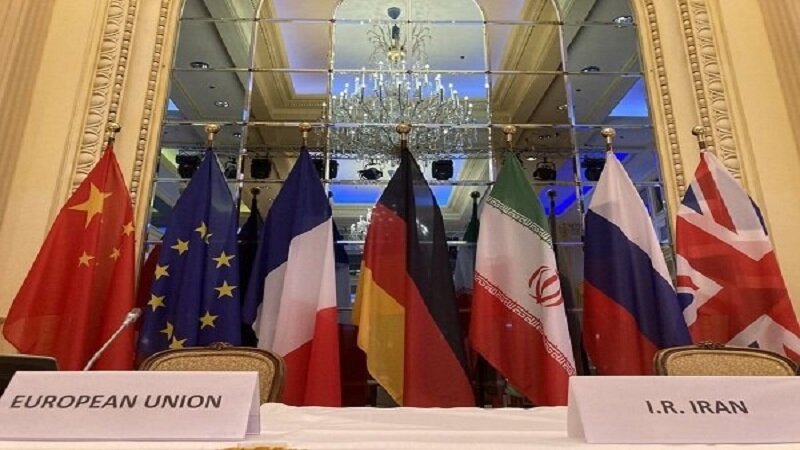
TEHRAN – Despite Western propaganda campaign in the run-up to Monday’s Vienna talks, Iran adopted a carefully crafted position during the talks amid muted hopes for a good, swift agreement.
Diplomats from Iran the P4+1 group of countries -China, Russia, France, and the UK plus Germany – gathered at the Palais Coburg hotel in Vienna amid global fanfare. It marked the resumption of the talks after a break of more than five months.
Ali Bagheri Kani, the deputy foreign minister of Iran, and Enrique Mora, EU deputy foreign policy chief, jointly chaired Monday’s plenary session.
Western media outlets purposefully depicted the overall situation in Vienna as somber, even before the negotiators reconvene the much-awaited meeting. They warned of Iranian “maximalist demands,” broached the idea of an interim agreement, and accused Iran of not being serious.
But the meeting debunked all these narratives. Iran’s seriousness became clear as soon as the Iranian negotiating team arrived in Vienna. It soon came to light that Iran has sent a 40-strong team comprised of seasoned experts from many sectors in the country’s economy, an indication that Iran was all-prepared to make a good deal even in the first round of talks, unlike the U.S. which, expecting unseriousness on the part of Iran, dispatched a small legal and political team.
During the meeting, Iran once again showed its seriousness. Contrary to the fears of the West, Iran presented what it has been publicly saying over the past weeks: a verifiable and effective lifting of all U.S. sanctions on Tehran, a guarantee that the U.S. won’t back down on its word again.
Addressing the meeting, Bagheri Kani stressed the need to lift all inhumane and coercive U.S. sanctions against the Iranian people, saying the lifting of sanctions must be the top priority in the talks.
While noting that the Islamic Republic has demonstrated its adherence to its obligations in practice, the head of the Iranian delegation stressed Tehran’s determination to reach a just understanding that serves the legitimate interests of Iran.
Prior to the meeting, Western diplomats expressed pessimism. But after the meeting, many diplomats came out with cautious optimism. “I feel extremely positive about what I have seen today,” Mora said after the meeting, noting that there is “clearly a will” by the Iranian side to revive a 2015 nuclear deal, officially known as the Joint Comprehensive Plan of Action (JCPOA).
The Russian envoy to the talks, Mikhail Ulyanov, described the resumption of Vienna talks as “quite successful.”
The lead Iranian negotiator also said that he was optimistic about the talks.
The optimism is a result of Iran’s balanced position in Vienna that set things straight and addressed the root cause of the current situation. Bagheri Kani spoke of claims by some Western parties about revival of the Iran nuclear deal, stressing that a revival of the JCPOA is nothing more than an exaggeration as long as the U.S. campaign of maximum pressure is alive.
The Iranian position led to a number of things that would help pave the way for more result-oriented talks. First, Iran made it clear that U.S. sanctions should be lifted at once, not in a phased-out way.
In remarks to Iran’s state TV, Bagheri Kani underlined this position, saying that sanctions must be removed all at once. This simply means that there would be no such thing as an interim agreement that is being raised by Western diplomatic circles. Because an interim agreement would require partial removal of the sanctions. And this would run counter to Iran’s core position of the need to lift all sanctions at once.
On Tuesday, the Qatari-owned Al Jazeera new television quoted an Iranian official as rejecting the idea of reaching an interim government with the negotiating partners in Vienna.
The unidentified official also said Iran has other options if negotiations fail, and the other parties know that. This brings us to another outcome of the talks.
Iran has shown its seriousness and willingness to reach a good deal. But would be extremely parochial not to have a plan B.
The principles and requirements of the new round of talks featured high in the Monday talks. The Iranian negotiating team sought to set out the principles and foundations of talks, and it did it successfully.
But what if the West violated these principles. Herein lies the importance of Iran’s plan B. So far, Iran has refrained from laying out its plan B but a senior Iranian lawmaker has said that Iran does have “other scenarios” if the West violates the principles set out during the negotiations. “If the West does not implement the principles of negotiation, including the implementation of agreement and mutual respect, and abuses again, Iran has other scenarios on the table,” the lawmaker, Mahmoud Abbas Zadeh Meshkini, the spokesman for the Iranian Parliament’s National Security and Foreign Policy Committee, said in remarks to Mehr News on Tuesday.

No comments:
Post a Comment